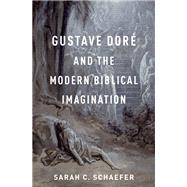
Gustave Doré and the Modern Biblical Imagination
by Schaefer, Sarah C.Buy New
Rent Textbook
Rent Digital
Used Textbook
We're Sorry
Sold Out
How Marketplace Works:
- This item is offered by an independent seller and not shipped from our warehouse
- Item details like edition and cover design may differ from our description; see seller's comments before ordering.
- Sellers much confirm and ship within two business days; otherwise, the order will be cancelled and refunded.
- Marketplace purchases cannot be returned to eCampus.com. Contact the seller directly for inquiries; if no response within two days, contact customer service.
- Additional shipping costs apply to Marketplace purchases. Review shipping costs at checkout.
Summary
Doré's Bible illustrations received widespread critical acclaim among both religious and lay audiences, and the next several decades saw unprecedented dissemination of the images on an international scale. In 1868, the Doré Gallery opened in London, featuring monumental religious paintings that drew
2.5 million visitors over the course of a quarter-century; when the gallery's holdings travelled to the United States in 1892, exhibitions at venues like the Art Institute of Chicago drew record crowds. The United States saw the most creative appropriations of Doré's images among a plethora of
media, from prayer cards and magic lantern slides to massive stained-glass windows and the spectacular epic films of Cecile B. DeMille.
This book repositions biblical imagery at the center of modernity, an era that has often been defined through a process of secularization, and argues that Doré's biblical imagery negotiated the challenges of visualizing the Bible for modern audiences in both sacred and secular contexts. A set of
texts whose veracity and authority were under unprecedented scrutiny in this period, the Bible was at the center of a range of historical, theological, and cultural debates. Gustave Doré is at the nexus of these narratives, as his work established the most pervasive visual language for biblical
imagery in the past two and a half centuries, and constitutes the means by which the Bible has persistently been translated visually.
Author Biography
Sarah C. Schaefer is an historian of modern art and visual culture, whose work focuses on religious media, technologies of reproduction, medieval revivalisms, and archaeological representation. Her writings have appeared in Word & Image, Material Religion, and Nineteenth-Century Art Worldwide. She
has curated several exhibitions, including The World Turned Upside Down: Apocalyptic Imagery in England, 1750-1850 at Marquette University's Haggerty Museum of Art, and is currently working on a show that explores the manuscripts of J. R. R. Tolkien through the lens of his career as a medieval
philologist.
Table of Contents
Table of Contents
Acknowledgements
Introduction
Chapter 1: The Light of the Word
Chapter 2: The Good News
Chapter 3: Brought to Ruin
Chapter 4: The Message is Seen
Chapter 5: Peddling for Profit
Epilogue: The Light of the Word
Bibliography
An electronic version of this book is available through VitalSource.
This book is viewable on PC, Mac, iPhone, iPad, iPod Touch, and most smartphones.
By purchasing, you will be able to view this book online, as well as download it, for the chosen number of days.
Digital License
You are licensing a digital product for a set duration. Durations are set forth in the product description, with "Lifetime" typically meaning five (5) years of online access and permanent download to a supported device. All licenses are non-transferable.
More details can be found here.
A downloadable version of this book is available through the eCampus Reader or compatible Adobe readers.
Applications are available on iOS, Android, PC, Mac, and Windows Mobile platforms.
Please view the compatibility matrix prior to purchase.
